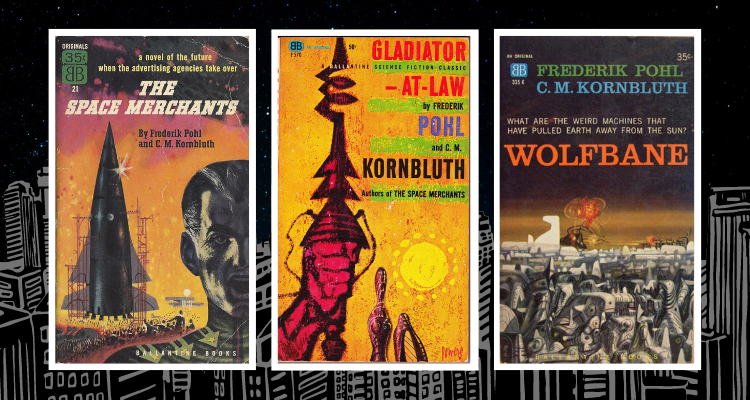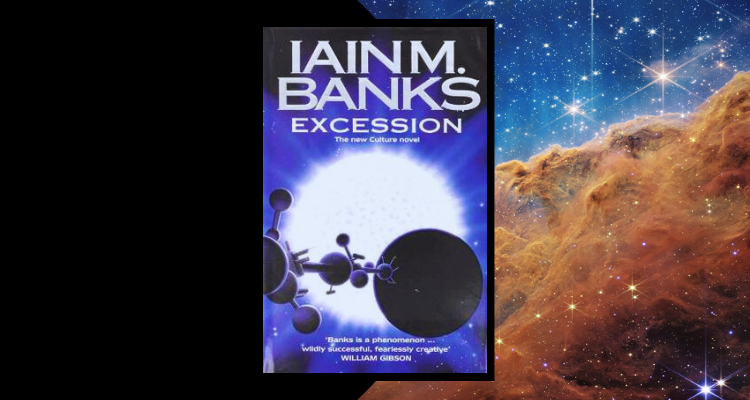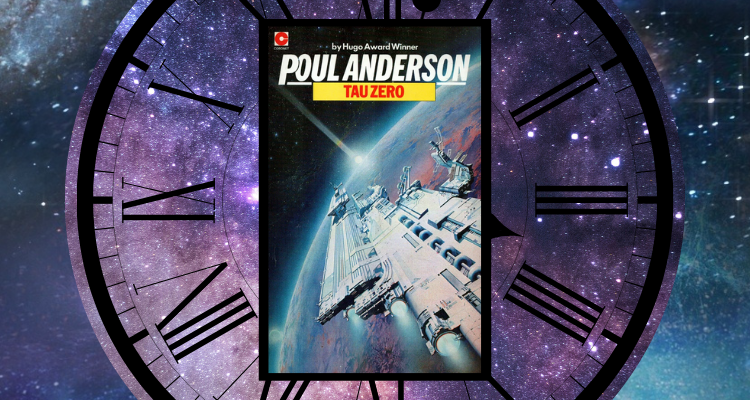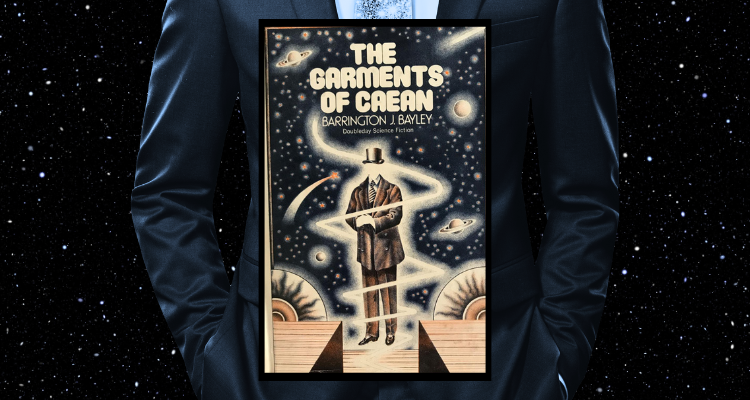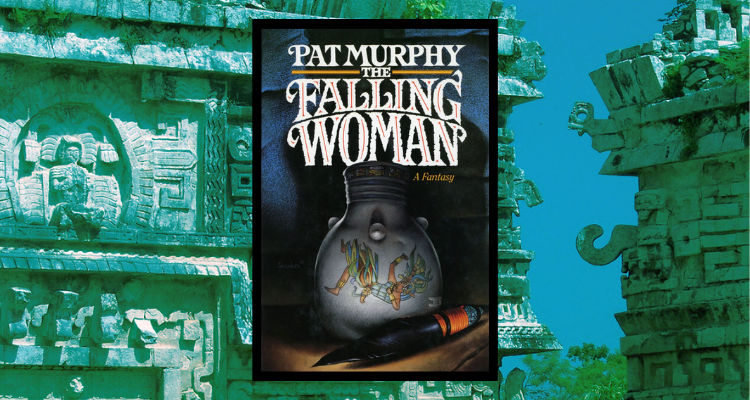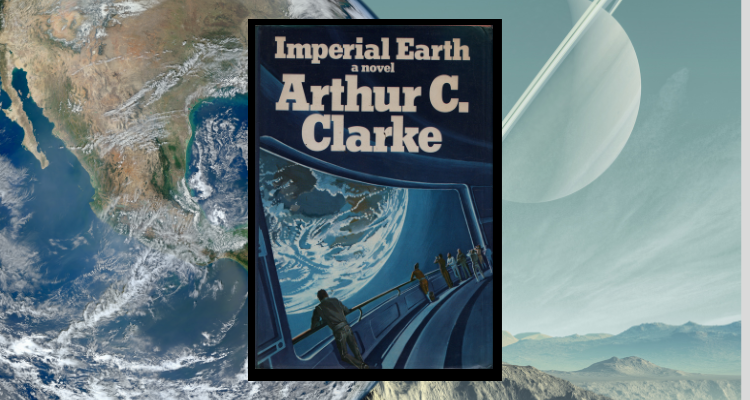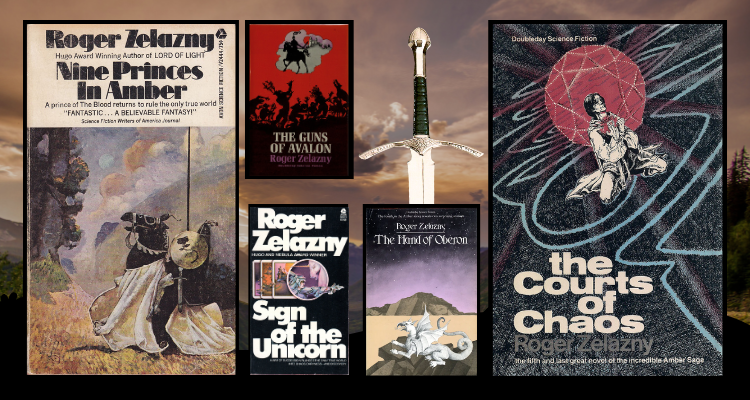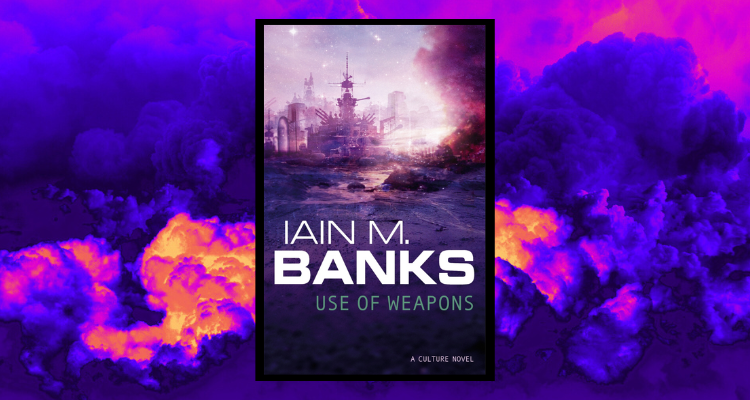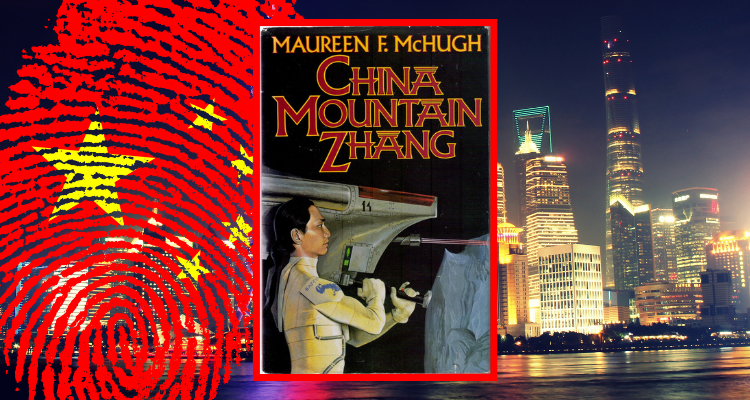SF’s greatest partnership? Three novels by Frederik Pohl and Cyril M. Kornbluth (1952 - 1959)4/25/2024
The Futurians were likely the most famous and important fan group in the history of science fiction. Based in New York City in the 1930s and 1940s, they included SF fans who went on to become successful writers, artists, editors, and agents in the field. Some of the most important writers in the group included Isaac Asimov, James Blish, and two men who formed possibly the most important collaboration in science fiction.
That partnership was between Frederik Pohl (1919 - 2013) and Cyril M. Kornbluth (1923 - 1958). They worked together from 1940 until the latter’s untimely death at the age of just 34. In that time, they collaborated on several short stories and four science fiction novels, of which three are considered classics. These are The Space Merchants (1952), Gladiator-at-Law (1955), and Wolfbane (1959). This special feature takes a brisk tour through these books, each a classic 1950s SF in its own right which add up to a memorable body of work.
0 Comments
The Culture discovers that even its abilities have limits, in the fourth novel in Banks’ revered series.
Following the publication of Useof Weapons in 1990, Iain M. Banks took a break from his Culture setting. Over the next several years, he published three so-called “mainstream” novels and Feersum Endjinn (1994), a standalone science fiction book which won the BSFA Award for Best Novel. Banks returned to his post-scarcity setting with Excession (1996), which secured Banks his second BSFA Award within three years. Today, Excession remains one of the most popular entries in the series, and some consider it to be the best.
The novel takes its title from a designation given by the Culture to a strange, vast artefact which suddenly appears on the edge of known space. The Excession is a black body sphere over 50 km across, which appears able to exert previously unseen influence on nearby space. Its emergence draws in two separate Culture factions, an ex-Culture splinter group, a militaristic empire known as the Affront, and a handful of humans. The novel allows Banks to explore how the Culture responds to an issue outside their previous experience, what he calls an “outside context problem”.
Cosmic-scale terror and wonder mingle in Poul Anderson's classic of hard science fiction.
Interstellar travel would require an extraordinary level of sustained acceleration. Many science fiction stories take this technology for granted. The idea of faster-than-light (FTL) travel conflicts with what we know about causality, but is a common trope in SF. Often, travel between stars is merely a means to an end, a way of getting to the next battle or galaxy-shaking discovery. Poul Anderson’s novel Tau Zero considers seriously the implications of massive acceleration. It is rooted in a question: what would happen if a starship was unable to stop accelerating?
Originally published in 1970, Tau Zero sets its characters on a genuinely mind-boggling trip through the cosmos, one which places an almost intolerable strain on their society, their relationships, and their very sanity. The book has been recognised as a landmark in hard science fiction for over 50 years. In 1985, David Pringle declared it “second to none” among novels which emphasise scientific plausibility. Even today, Tau Zero impresses with its vast scale and scientific rigour. While these are the reasons it remains an SF classic, the book is also worth reading for its political and social themes which are rooted interestingly in Anderson’s personal background.
Exploring a thrillingly unusual British space opera focusing on “one of the five best-dressed men in the universe.”
In the galaxy-spanning human civilisation of the far future, Peder Forbarth is a nobody. Reluctantly, he joins an expedition to the hostile planet Kyre. The objective is to conduct an illegal salvage operation on a crashed freighter from the mysterious splinter civilisation of Caean. The result proves to be life-changing - because Peder Forbarth is a tailor, and the freighter’s cargo is of inestimable value: the garments of Caean. The Garments of Caean is a science fiction novel by the British author Barrington J. Bayley (1937 - 2008). While getting his start in comics in the late 1950s, he met Michael Moorcock, who was to become a titan of British SF and especially fantasy. The two became friends and collaborators; in the 1960s Moorcock published Bayley’s stories in New Worlds magazine and consistently championed his work. Bayley published his first novel, The Star Virus, in 1970. He is generally thought to have hit his stride in the middle of the decade, publishing a string of inventive, fast-paced novels which fused pulp SF tropes with New Wave innovations. Originally published by Doubleday in February 1976, The Garments of Caean falls in the middle of this strongest period. It is a rip-roaring, planet-hopping SF adventure which also deals thoughtfully with cultural exchange, self-image, and whether the clothes really make the man.
Elizabeth Butler is an archaeologist who is shunned by her colleagues, but successful both in the field and as an author. What no-one else knows is that her excavations and popular books are made possible by a unique gift. When she is in the proximity of dig sites in Mexico, she can see Mayan people from the distant past, going about their business as they did a thousand years earlier. This ability to look into the past belongs to Elizabeth alone - or so she thinks.
Published in 1986, The Falling Woman is the second novel by Washington-born American author Pat Murphy. It would go on to win the 1987 Nebula Award for Best Novel, beating out books by authors including Greg Bear, Gene Wolfe, and David Brin. A unique contemporary fantasy, it is set in the archaeological site of Dzibilchaltún in Mexico’s Yucatan peninsula, and the nearby city of Mérida. Also an entry in Gollancz’s Fantasy Masterworks line, it deals powerfully with themes of belief, family, femininity, and mental illness.
It is 2276 and the Earth is a utopia. The population is only half a billion, crime and conflict are things of the past, and what we now call rewilding has taken place on a planetary scale. To Duncan Makenzie, this world is a deeply strange and confusing place. He is a scientist-administrator from humankind’s outermost colony - Titan, the largest of Saturn’s moons. Accepting an invitation to celebrate the quincentennial of the United States, Duncan visits Earth for the first time and must also handle sensitive business of his own.
Imperial Earth is the second of three novels Arthur C. Clarke published in the 1970s. Two of those novels are widely acclaimed classics, well-known today. Rendezvous with Rama (1973) is famed for its sense of wonder and won five major awards. The Fountains of Paradise (1979), popularised the concept of the space elevator and won both the Hugo and Nebula Awards for Best Novel. Despite Clarke’s high hopes for it - at one point he thought of it as “the big one” - Imperial Earth did not reach these heights. It won no awards and eventually fell out of print, where it remained for some time. The novel has returned to print, and today Imperial Earth joins Clarke’s other 1970s novels in Gollancz’s authoritative SF Masterworks collection. In his introduction to this edition, SF author Stephen Baxter mentions some of the book’s interesting themes. These include its greater emphasis on human relationships, its focus on economics, and Clarke’s position as a “technophilic optimist”. A brief look at the landmark fantasy series of infinite alternate worlds, formidable magic, and a royal family with an incredible talent for scheming. Roger Zelazny (1937 - 1995) made his name with a series of acclaimed works of science fiction in the 1960s, which included the novels This Immortal (1965) and Lord of Light (1967). These earned him the Hugo Award for Best Novel twice inside the space of three years. Critic Algis Budrys said of Zelazny's first story collection that the author was "beginning where other famous people have arrived".
This success was all the more striking given that Zelazny was not a full-time writer. For much of the 1960s, he was working as a civil servant for the U.S. Social Security Administration, and his writing time was limited to the evenings. It was only in 1969 that he felt able to leave formal work, and take up writing full-time. Shortly afterwards, he began to publish a lengthy fantasy series which came to be known as The Chronicles of Amber.
Across its vast orbital habitats and immense starships, the Culture supports a population of many billions. Within this multitude, only a tiny number of people make up Contact, the Culture’s diplomatic and military arm. Within that elite there is another elite. Special Circumstances is the shadowy group operating on the Culture’s ragged edge, where the civilisation’s highly-evolved morality weakens or breaks down altogether.
The Special Circumstances agent Diziet Sma and her loyal drone Skaffen-Amtiskaw have long relied on a particular operative. Born outside the Culture, this man is the consummate spy, soldier, and strategist. He is adept with every weapon, with every ruthless tactic required to pull off some of the Culture’s most Byzantine schemes. His name is Cheradenine Zakalwe. Use of Weapons is the third novel in Iain M. Banks’ beloved Culture series. While it was ultimately released in 1990, the first version of the book had been written 16 years earlier in 1974. With the encouragement of fellow science fiction writer Ken MacLeod, Banks returned to the story and radically re-worked it, notably by simplifying its dizzying structure. Today, the novel is probably the most popular and acclaimed of the ten books in the series. It is a fascinating character study of Zakalwe, an eye-opening insight into the nature of the Culture, and a thoughtful look at conflict, responsibility, and guilt.
In a talk given to the Philadelphia Science Fiction Society, Maureen F. McHugh identified a pervasive trend in SF:
“…something required for the genre or genres, whether to reestablish order or transcend it, is the hero who changes everything. [...] It doesn't matter if the story is on the scale of a city or a planet or the galaxy, sf is the story of the outsider who is smarter, mutated, or endowed with special powers and therefore is the person, the only person who can make the difference.”
In her debut novel China Mountain Zhang, McHugh set out to prove that a world-changing hero is not a precondition for an interesting science fiction story. The book is set at some point in the 22nd century, in a world in which the global balance of power has shifted dramatically. The United States has been brought low by a Second Great Depression and a bloody civil war. By contrast, socialist China is the preeminent superpower, extending its influence all the way to new colonies on Mars.
Zhang Zhongshan is a construction technician working in New York City. He has no towering ambitions, nor any desire to change his world. He wants only to make a good life for himself, which is complicated by his status as a gay man living under a regime in which homosexuality is illegal. China Mountain Zhang is not about changing the world, but about finding a way to live in it.
In 2006, the Spanish game developer Pyro Studios was full of confidence. With a new game nearly complete, they had big ambitions. The CEO, Ignacio Pérez, planned to grow the company from 70 staff to 250 over the next few years. Pyro would become not just a preeminent developer in Europe, but in the world.
In retrospect, these comments have a tragic feel. The game that Pyro was about to complete was Commandos: Strike Force and it would prove to be a stinging failure. Pérez’s big plans would never come to pass. Worse, his company would never again release a notable game. It would first be reduced to the relative ignominy of mobile game development, and then would finally close for good in 2017. On paper, Strike Force appeared to be based on good ideas and a sound business logic. It was intended as a means for Pyro Studios to capitalise on its established Commandos series, to move into cross-platform development, and to break into the lucrative console market. To all this, they would shift Commandos into a first-person shooter mould. In the end, the game badly alienated the company’s existing fans and failed to win new ones. Its critical and commercial failure contributed strongly to the demise of Pyro, long the foremost studio in Spain, and the Commandos series. Now that a new revival of the series is in development, it is interesting to go back to the disastrous fourth entry. Picking over the wreckage, it is clear that Pyro’s plans were not without merit. Strike Force is a desperately average game, released much too late to have a chance in a crowded World War II shooter market. But it does have good ideas, and a certain charm of its own. |
About
I write about classic science fiction and occasionally fantasy; I sometimes make maps for Doom II; and I'm a contributor to the videogames site Entertainium, where I regularly review new games. Categories
All
|
